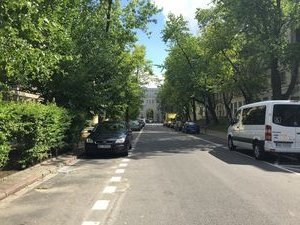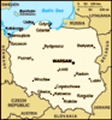Advertisement
Published: July 20th 2015

 Dzielna Street, Warsaw
Dzielna Street, Warsaw
My father was born at home on this street."Po" - "Lin" : legend has it that the name in Hebrew for Poland - Polin or Polania - originates in the fact that Poland was for a very long time seen by the Jews as a place of refuge, prosperity, and relative safety. The Hebrew Po-Lin can be translated as "Here you should rest/dwell." Alternatively, Polania can be translated as "Po"- Here, "Lan" - Rests/Dwells, "Yah" - God. In other words, God dwells here.
Historical documents from Jewish and Polish sources cite Jews arriving in Poland in the 11th century. At that time and for hundreds of years following, the Polish Kingdom was a pluralistic and remarkably tolerant society for its time. Its kings protected the Jews, so much so that by the middle of the 16th century some historians believe that around 75% of the world's Jews lived in Poland. Without the centuries of Polish Jewish life, Jewish history and Jewish culture would be unimaginable.
This brief foray into Polish Jewish history is not meant to glorify Poland or to smooth over the tragic end of that vital community and its lasting legacy. It's more to begin with an acknowledgment of the complexity of emotions I am

 Number Six Today
Number Six Today
Entirely rebuilt after the war.feeling since arriving here a few days ago. Three of my four grandparents come from the soil of this land (my mother's father is the only outlier, hailing from Odessa). My father was born in this very city 80 years ago on the street address that is the title of this post. I grew up hearing Polish spoken between his parents and between him and his parents. I grew up knowing that most of his family (and also my mother's mother's remaining relatives in Poland, including in all likelihood my grandmother's parents, some siblings, and cousins) were executed here for the crime of being Jews. I also knew that we had relatives who'd stayed in Poland after the war and who were now Catholic.
And here I am in this totally reconstructed city, the birthplace of my father, a city that was, as one writer I read wrote, a victim herself of Nazi "urbacide" - the intentional annihilation of a city, its people, its architecture, its infrastructure. And they succeeded to a very great extent. The Jews, for sure, were decimated, but they were not alone. By the end of the Nazi assault, helped by the fact that the

 It Helps to Speak Polish
It Helps to Speak Polish
My father talking with the taxi driver. Soviet army waited on the other side of the Vistula as the Polish Home Army valiantly attempted to defend the city, something like 80% of Warsaw was demolished. Pictures of it from 1945 look no different to me than the atom bombs' results on Hiroshima.
Yet today it is reborn and thriving. We visited the neighborhood where my father spent his first four and a half years. He was born on February 17, 1935 at 6 Dzielna Street in the Muranow District, a heavily Jewish area in the northern part of the city. It turns out that it is only two blocks away from the new Jewish museum of Warsaw, called Polin, which is itself at the center of what was the Warsaw Ghetto during World War Two. We meant to take a taxi straight to the museum, but I asked my father to tell the taxi driver to drive to go by his street. We got there and I walked down the leafy street, imagining my grandparents on this quiet street with a park at one end at the intersection of Dzielna and Zamenhof Street (named after the Jewish founder of Esperanto). I cried a little to myself

 Park Across the Street
Park Across the Street
Did my father play here as a child? Was it a park in the 30s?as I walked alone and my father chatted with the taxi driver. The new houses on the street were built out of the rubble of the ghetto, which the street was part of, and became a sprawling housing estate in the post war Communist period.
I knew that my grandparents had strong ties to their Jewishness and the realization that my father was born at home in this street in the heart of a dynamic if increasingly threatened Jewish community as the 30s hurdled toward war, is something I'm still absorbing. The fact that it is only a five minute walk from the monument to the Ghetto fighters and to the new museum is a powerful symbol to me of my ongoing connection to the study of Jewish history.
It has also been moving to me to watch and listen to my father banter away in Polish with the taxi drivers we've taken to and fro, letting them know he was born here, and observing the drivers interact with him in a friendly and respectful manner. Who knows what their families endured during the war or what they think of Jews. But there is a certain satisfaction in

 Jewish Cultural Center
Jewish Cultural Center
Around the corner from his home.seeing my father affirm his origins in this city in such a natural way.
Advertisement
Tot: 0.128s; Tpl: 0.012s; cc: 11; qc: 46; dbt: 0.0672s; 1; m:domysql w:travelblog (10.17.0.13); sld: 1;
; mem: 1.2mb















Sarah Siegel
non-member comment
Our Fathers
Sarah, our fathers had such different childhoods. This post reminds me of the time my dad took me to the spot on 10th and G SW in Washington, DC to show me where he lived, growing up. The house was gone, but the tree he used to look at from his window was still there and he went on for awhile about how in the mornings, they could hear bugling from the nearby Marine compound. And how he'd rollerskate to the relatively nearby Library of Congress to do his homework. My father (z"l) would have been 89 today. I'm envious of the opportunity you're having with your dad, as an adult, to see his home, but grateful that my dad (z"l) took me to visit his while he was still alive. I think I was like 11 or 12 at most. I'm also grateful that his parents (z"l), both from Stolin, Russia -- its borders varied and it was either Russia or Poland, depending on the era, but it was Russia when they lived there, and they spoke Yiddish and Russian -- escaped Pogroms and made it to D.C. with their familiess, and so none of our family were lost in the Holocaust. I loved reading this post especially, Sarah, and wish both of you continued energy for these profound encounters with the past and present.